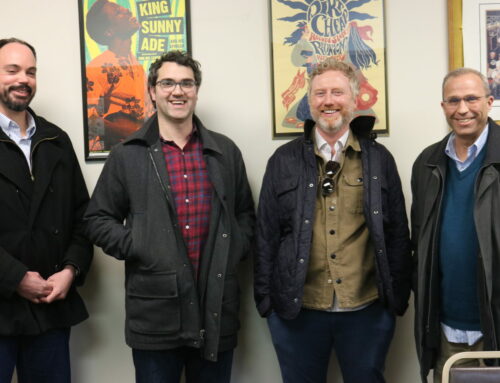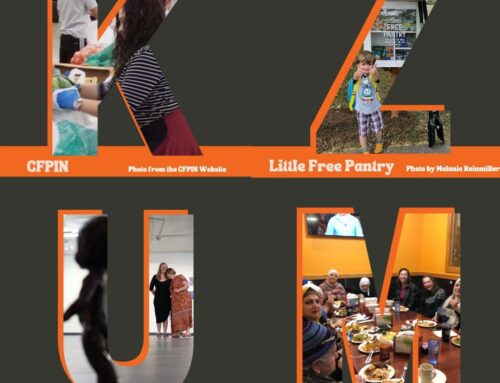By Juliet Bromme
March 24, 2021
Even through Zoom’s pixelated screen I see the poster. Hung in the corner of Susanne Blue’s office, it is a print of Mother Teresa, her smiling eyes beaming behind the blue striped head scarf that flows past her folded hands. Mother Teresa declared, “If we have no peace, it is because we have forgotten that we belong to each other.” There are many organizations in the city of Lincoln that are devoted to living this dictum. 
Blue is the executive director of Matt Talbot Kitchen, which is an outreach center and community kitchen founded in 1992. Until she was hired seven years ago to expand the organization’s services beyond feeding the hungry to include housing, addiction counseling and prevention programs, it was run entirely by volunteers. Blue is dedicated to maintaining Matt Talbot Kitchen’s mission – even when it is difficult. In early February, Lincoln experienced harsh weather and subzero temperatures. “When it became so cold, we were determined to open safely for those who have no place to go, those who were on the streets,” says Blue.
A year ago, Matt Talbot Kitchen had to adapt to follow pandemic guidelines and provide new space for people because of the distancing and occupancy restrictions. “Prior to this year and pandemic, we rarely put people in hotels, but this became more of a common practice.” Because of that experience, Matt Talbot Kitchen was prepared when temperatures dropped below zero. The organization provided hotels for individuals currently homeless, and its network of outreach workers scoured Lincoln on foot and in vehicles to confirm that familiar spots and campsites that serve as temporary shelters were stocked with warm blankets and tents for individuals who frequented them.
 The shelter at People’s City Mission is open for anyone. The director of the men’s shelter, Art Wilson, explains that “in the men’s shelter, we have 101 beds but can have up to 160 men during the winter months. Furthermore, we provide coats, hats, gloves and other items to protect people from the elements.” Since many organizations are only day shelters, it is important for individuals to have access to the Mission at night, especially since Lincoln often experiences chilly temperatures during the winter.
The shelter at People’s City Mission is open for anyone. The director of the men’s shelter, Art Wilson, explains that “in the men’s shelter, we have 101 beds but can have up to 160 men during the winter months. Furthermore, we provide coats, hats, gloves and other items to protect people from the elements.” Since many organizations are only day shelters, it is important for individuals to have access to the Mission at night, especially since Lincoln often experiences chilly temperatures during the winter.
Officer Melissa Ripley is the homeless specialist for the Lincoln Police Department. She recognizes that cold spells, especially ones as severe as last month’s, can be brutal for the unsheltered population. To provide support in February, she was actively looking for people whom she knew were currently homeless to offer clothing and blankets. Additionally, she connected with outreach workers to help locate and shelter people who needed it. “We have always worked well together to try to serve the homeless population as best we can and will continue to do so in the future.”
Many individuals who arrive at kitchens for meals are disproportionately impacted by inclement weather. Lisa Janssen, Community Action’s Gathering Place program administrator, is very aware of this. “We had a good supply of socks, gloves, hats, blankets and hand warmers to distribute to guests. We tried to share those items in advance of, and on the coldest days,” she says. “People often come to us for support because they’ve experienced something unexpected in their life that has impacted their stability.” When cold fronts sweep the city, stability is threatened. “Access to food is a basic need. If someone has reliable and consistent access to food, then they are better able to move toward economic stability. During the coldest winter days, a hot meal can provide warmth that can help ease the struggles related to the weather.”
After these bits of bad weather pass, the organizations review and adapt as necessary. By continuously building on initiatives and learning from the past, they become stronger sources of support for individuals experiencing homelessness. However, Wilson believes there is always room for improvement at the City Mission and beyond. As the pandemic persists, it brings to light challenges that still don’t have solutions. “Lincoln needs a bigger shelter,” he believes, “one that can deal with the large number of individuals during the cold months, and be able to adapt to something like a pandemic. During the last year, the shelter has not been able to adequately social distance or quarantine people who needed it. If an unsheltered individual contracted COVID-19, there was nowhere for them to go.”
Understanding the needs and wishes of unsheltered individuals is essential to supporting them. Matt Martinosky, one of two street outreach coordinators for CenterPointe, a nonprofit specializing in mental health and addiction treatment for homeless and low income individuals, explains that during the winter, those who don’t want to or aren’t able to visit shelters, reside in camps that are often fortified. While this doesn’t negate the challenges that are exacerbated in wintry weeks, it reveals why simple acts of benevolence often make the biggest impact.
Purely acknowledging our unsheltered neighbors makes a difference, Wilson recognizes. “People living on the streets are lonely and tired and don’t like being treated like they don’t exist.” From personal experience he knows the positive effects that transpire after being treated like a person worthy of kindness and respect.
There’s a stigma that surrounds unsheltered individuals. “Sometimes there’s underlying conditions that can lead to homelessness. But, that doesn’t encapsulate them as a whole,” says Martinosky. When showing people respect, we recognize things aren’t always as they seem. “We’re humans interacting with humans and there’s no reason to treat anyone any differently.”
“We all have a story as to how we got to where we are today and by learning other’s stories, you might learn something about yourself or the world that you can use to make a difference,” Officer Ripley adds.
Some days we need a hand, other days we lend one. CenterPointe, the Gathering Place, People’s City Mission, Matt Talbot Kitchen and many other organizations remind us that even when frigid conditions threaten the most susceptible, we still belong to each other.
Susanne Blue of Matt Talbot Kitchen thoughtfully smiles through the screen. “Basically, we won’t rest until we have a situation where no one is sleeping in their car, no family is experiencing homelessness… we are here 365 days a year for some of our community’s most vulnerable and we will continue to do that. And if one person showed up, that would be worth it.”
After all, we belong to each other.
Even through Zoom’s pixelated screen I see the poster. Hung in the corner of Susanne Blue’s office, it is a print of Mother Teresa, her smiling eyes beaming behind the blue striped head scarf that flows past her folded hands. Mother Teresa declared, “If we have no peace, it is because we have forgotten that we belong to each other.” There are many organizations in the city of Lincoln that are devoted to living this dictum.

Blue is the executive director of Matt Talbot Kitchen, which is an outreach center and community kitchen founded in 1992. Until she was hired seven years ago to expand the organization’s services beyond feeding the hungry to include housing, addiction counseling and prevention programs, it was run entirely by volunteers. Blue is dedicated to maintaining Matt Talbot Kitchen’s mission – even when it is difficult. In early February, Lincoln experienced harsh weather and subzero temperatures. “When it became so cold, we were determined to open safely for those who have no place to go, those who were on the streets,” says Blue.
A year ago, Matt Talbot Kitchen had to adapt to follow pandemic guidelines and provide new space for people because of the distancing and occupancy restrictions. “Prior to this year and pandemic, we rarely put people in hotels, but this became more of a common practice.” Because of that experience, Matt Talbot Kitchen was prepared when temperatures dropped below zero. The organization provided hotels for individuals currently homeless, and its network of outreach workers scoured Lincoln on foot and in vehicles to confirm that familiar spots and campsites that serve as temporary shelters were stocked with warm blankets and tents for individuals who frequented them.
The shelter at People’s City Mission is open for anyone. The director of the men’s shelter, Art Wilson, explains that “in the men’s shelter, we have 101 beds but can have up to 160 men during the winter months. Furthermore, we provide coats, hats, gloves and other items to protect people from the elements.” Since many organizations are only day shelters, it is important for individuals to have access to the Mission at night, especially since Lincoln often experiences chilly temperatures during the winter.

Officer Melissa Ripley is the homeless specialist for the Lincoln Police Department. She recognizes that cold spells, especially ones as severe as last month’s, can be brutal for the unsheltered population. To provide support in February, she was actively looking for people whom she knew were currently homeless to offer clothing and blankets. Additionally, she connected with outreach workers to help locate and shelter people who needed it. “We have always worked well together to try to serve the homeless population as best we can and will continue to do so in the future.”
Many individuals who arrive at kitchens for meals are disproportionately impacted by inclement weather. Lisa Janssen, Community Action’s Gathering Place program administrator, is very aware of this. “We had a good supply of socks, gloves, hats, blankets and hand warmers to distribute to guests. We tried to share those items in advance of, and on the coldest days,” she says. “People often come to us for support because they’ve experienced something unexpected in their life that has impacted their stability.” When cold fronts sweep the city, stability is threatened. “Access to food is a basic need. If someone has reliable and consistent access to food, then they are better able to move toward economic stability. During the coldest winter days, a hot meal can provide warmth that can help ease the struggles related to the weather.”
After these bits of bad weather pass, the organizations review and adapt as necessary. By continuously building on initiatives and learning from the past, they become stronger sources of support for individuals experiencing homelessness. However, Wilson believes there is always room for improvement at the City Mission and beyond. As the pandemic persists, it brings to light challenges that still don’t have solutions. “Lincoln needs a bigger shelter,” he believes, “one that can deal with the large number of individuals during the cold months, and be able to adapt to something like a pandemic. During the last year, the shelter has not been able to adequately social distance or quarantine people who needed it. If an unsheltered individual contracted COVID-19, there was nowhere for them to go.”
Understanding the needs and wishes of unsheltered individuals is essential to supporting them. Matt Martinosky, one of two street outreach coordinators for CenterPointe, a nonprofit specializing in mental health and addiction treatment for homeless and low income individuals, explains that during the winter, those who don’t want to or aren’t able to visit shelters, reside in camps that are often fortified. While this doesn’t negate the challenges that are exacerbated in wintry weeks, it reveals why simple acts of benevolence often make the biggest impact.
Purely acknowledging our unsheltered neighbors makes a difference, Wilson recognizes. “People living on the streets are lonely and tired and don’t like being treated like they don’t exist.” From personal experience he knows the positive effects that transpire after being treated like a person worthy of kindness and respect.
There’s a stigma that surrounds unsheltered individuals. “Sometimes there’s underlying conditions that can lead to homelessness. But, that doesn’t encapsulate them as a whole,” says Martinosky. When showing people respect, we recognize things aren’t always as they seem. “We’re humans interacting with humans and there’s no reason to treat anyone any differently.”
“We all have a story as to how we got to where we are today and by learning other’s stories, you might learn something about yourself or the world that you can use to make a difference,” Officer Ripley adds.
Some days we need a hand, other days we lend one. CenterPointe, the Gathering Place, People’s City Mission, Matt Talbot Kitchen and many other organizations remind us that even when frigid conditions threaten the most susceptible, we still belong to each other.
Susanne Blue of Matt Talbot Kitchen thoughtfully smiles through the screen. “Basically, we won’t rest until we have a situation where no one is sleeping in their car, no family is experiencing homelessness… we are here 365 days a year for some of our community’s most vulnerable and we will continue to do that. And if one person showed up, that would be worth it.”
After all, we belong to each other.
Juliet Bromme is a journalism intern with KZUM.





